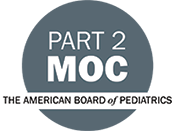Introduction to Culturally and Linguistically Appropriate Services (CLAS) and Minority Health Disparities
|
CME Certificate Fee: $37.50 (USD) for certificate
Optional Maintenance of Certification Credit (MOC) Fee: $10.00 (USD) per point
|
 |
|
1.50 AMA PRA Category 1 Credit(s)TM
1.50 Part II MOC points are available for these specialty board(s):
American Board of Internal Medicine
- Credit Type: Medical Knowledge
- Practice Areas: Internal Medicine
American Board of Pediatrics
- Credit Type: Lifelong Learning & Self-Assessment
- Practice Areas: Professionalism/Patient Safety/Other Skills
Estimated time to complete this activity: 1.50 hours
|
 |
Author(s)/Editor(s): John Bormanis, PhD.
Further Author/Editor Information | Further CME Information |
 |
| Meets Special CME Requirements in: Connecticut, District of Columbia, Michigan, Nevada, New Jersey, Oregon, Rhode Island Learn More >> |
 |
Outcome Objectives:
As a result of completing this activity, the participant will be better able to:
- Describe the National Culturally and Linguistically Appropriate Services (CLAS) standards of the USDHHS Office of Minority Health and how they impact the ethical responsibilities of medical service providers.
- Define “health disparities” and how they disproportionately affect ethnic and racial minority populations in the United States.
- Recognize that “ethnicity,” “race,” and “culture” are fluid categories that overlap and also include other aspects of identity that can include religion, sexual orientation, gender, class, etc.
- Describe the practice of “cultural competence” in the health care setting.
- Successfully navigate a Mexican American patient with limited English proficiency through the process of establishing culturally and linguistically care and obtaining referrals for treatment of her asthma.
- Utilize the 7 basic components of asthma care and management according the National Asthma Education and Prevention Program (2007).
Learning Format: Case-based, interactive online course, including mandatory assessment questions (number of questions varies by course or module). Please also read the Technical Requirements.
|
 |
|
 |
CME Sponsor: University of Arizona College of Medicine - Tucson
Credit Designation and Accreditation Statements >> |
 |
| Current CME Approval Period:
May 1, 2024 - April 30, 2027
|
 |
| Original Release Date: May 1, 2015 |
 |
| Most Recent Review by Author: May 1, 2024 |
 |
| Most Recent Review by CME Sponsor: May 1, 2024 |
 |
| Financial Support Received: Supported by federal HRSA grant #D34HP24460. |
 |
Introduction to Culturally and Linguistically Appropriate Services (CLAS) and Minority Health Disparities
| 1.50 AMA PRA Category 1 Credit(s)TM
1.50 Part II MOC points are available for these specialty board(s) (Optional):
American Board of Internal Medicine
- Credit Type: Medical Knowledge
- Practice Areas: Internal Medicine
American Board of Pediatrics
- Credit Type: Lifelong Learning & Self-Assessment
- Practice Areas: Professionalism/Patient Safety/Other Skills
|
 |
| Current CME Approval Period:
May 1, 2024 - April 30, 2027
|
 |
| Financial Support Received: Supported by federal HRSA grant #D34HP24460. |
 |
|
ACCME/AMA PRA Accreditation Statement
The University of Arizona College of Medicine - Tucson is accredited by the Accreditation Council for Continuing Medical Education to provide continuing medical education for physicians.
The University of Arizona College of Medicine - Tucson designates this enduring material for a maximum of 1.50 AMA PRA Category 1 Credit(s)TM. Physicians should claim only the credit commensurate with the extent of their participation in the activity.
CME Office Contact Information and CME Disclosure
The University of Arizona College of Medicine - Tucson
Office of Continuing Medical Education
520-626-7832
uofacme@arizona.edu
The following University of Arizona College of Medicine - Tucson CME Reviewers, Activity Directors, or Planning Committee Members have no relevant financial relationships with ineligible companies (commercial interests) that could constitute a conflict of interest with the proposed activity:
Robert Amend, M.Ed.
Randa Kutob, MD
|
 |
MOC Recognition Statement(s)
 Successful completion of this CME activity, which includes participation in the evaluation component, enables the participant to earn up to 1.50 Medical Knowledge Part II MOC points in the American Board of Internal Medicine's (ABIM) Maintenance of Certification (MOC) program. Participants will earn MOC points equivalent to the amount of CME credits claimed for the activity. It is the CME activity provider's responsibility to submit participant completion information to ACCME for the purpose of granting ABIM MOC credit. Successful completion of this CME activity, which includes participation in the evaluation component, enables the participant to earn up to 1.50 Medical Knowledge Part II MOC points in the American Board of Internal Medicine's (ABIM) Maintenance of Certification (MOC) program. Participants will earn MOC points equivalent to the amount of CME credits claimed for the activity. It is the CME activity provider's responsibility to submit participant completion information to ACCME for the purpose of granting ABIM MOC credit.
 Successful completion of this CME activity, which includes participation in the activity and individual assessment of and feedback to the learner, enables the learner to earn up to 1.50 MOC points in the American Board of Pediatrics’ (ABP) Maintenance of Certification (MOC) program. It is the CME activity provider’s responsibility to submit learner completion information to ACCME for the purpose of granting ABP MOC credit. Successful completion of this CME activity, which includes participation in the activity and individual assessment of and feedback to the learner, enables the learner to earn up to 1.50 MOC points in the American Board of Pediatrics’ (ABP) Maintenance of Certification (MOC) program. It is the CME activity provider’s responsibility to submit learner completion information to ACCME for the purpose of granting ABP MOC credit.
If you elect to receive MOC credit for this course, you give permission for VLH.com to share your information and activity completion data with the ACCME and the specialty board(s) chosen through the ACCME's Program and Activity Reporting System (PARS).
|
 |
Introduction to Culturally and Linguistically Appropriate Services (CLAS) and Minority Health Disparities
|
About the Author
 |
John Bormanis, PhD
Dr. Bormanis has been a Research Assistant Professor in the Department of Family and Community Medicine at the University of Arizona College of Medicine in Tucson, AZ. Dr. Bormanis' research interests include cross-cultural communication, medical education, gender studies, and the intersection of health and spirituality.
Disclosure: Dr. Bormanis states that he does not have any financial arrangements that could constitute a conflict of interest. |
|
Introduction to Culturally and Linguistically Appropriate Services (CLAS) and Minority Health Disparities
Introduction to Culturally and Linguistically Appropriate Services (CLAS) and Minority Health Disparities
|
Technical Requirements
This web-based activity is offered online and requires an always-on connection to the Internet (the activity cannot be downloaded). The activity works on PC or Mac computers and most tablet computers. The activity should work with the newer versions of major Internet browsers, including Edge, Chrome, Safari, and Firefox. JavaScript should be enabled in all browsers, and Popups and first party cookies need to be accepted from www.VLH.com. You should also have the latest, free  Adobe Reader installed for reading Adobe Reader installed for reading  documents. documents. For additional information, read the Technical Assistance FAQ.

|
 |










 Home | Feedback | Privacy Policy | E-mail Policy | Refund Policy | Terms of Use | Contact
Home | Feedback | Privacy Policy | E-mail Policy | Refund Policy | Terms of Use | Contact